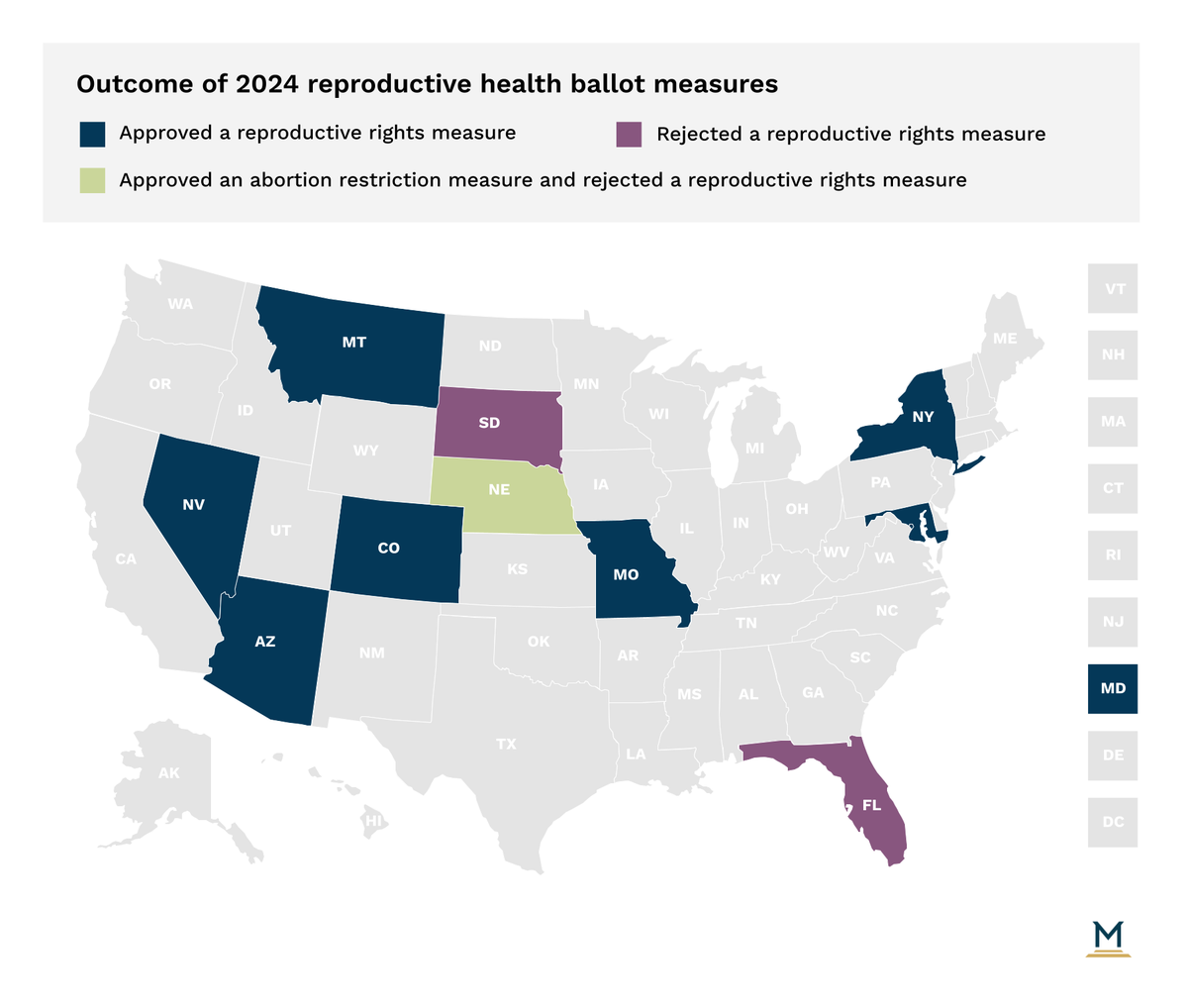
Health Care & Wellness
Rural Health Transformation Program 101 (Federal Grants to States to Improve Rural Healthcare)
December 18, 2025 | Brock Ingmire
November 21, 2024 | Mary Kate Barnauskas, Townsend Brown, Brock Ingmire

Key Takeaways:
Over the next year, President-Elect Donald Trump and his incoming Administration will have several consequential decisions to make that will dictate the landscape of state health policy. At the same time, states aren’t waiting for the incoming Administration before making their own moves on health care. Election night saw 14 states vote on ballot initiatives related to health care and in the proceeding days, state legislative leaders have called for special sessions to ensure further work on health care prior to the new year.
Arguably no industry is more intertwined between federal and state policy decisions than health care. The announced nomination of Robert F. Kennedy, Jr. for the Department of Health and Human Services Secretary and Dr. Mehmet Oz as Administrator of the Centers for Medicare & Medicaid Services (CMS) will undoubtedly raise questions relative to food additives, pesticides, public health programming and vaccine research, development, and administration. To what extent their policy perspectives on those issues will influence regulatory and legislative policy at the state level remains to be seen. However, we do have more concrete expectations as to how a Trump Administration will impact states’ policymaking on Medicaid and Marketplace coverage.
More so than the current Administration, the second Trump presidency will likely provide more deference to states to experiment with their Medicaid programs. Outside of the potential scenario that Medicaid funding caps or other similar limitations may be installed, the incoming leadership at CMS is likely to grant flexibility to states relative to implementing more restrictive provider reimbursement policies, restricting who is eligible for Medicaid and conditions of that eligibility (i.e., work requirements), and what services are covered by Medicaid. Although unlikely to be pulled back in its entirety, it’s likely that recent CMS guidance to extend federal funds to cover a wide range of services that address health-related social needs will be narrowed.
For states with state-based exchanges under the Affordable Care Act (ACA), new CMS leadership will likely revoke Section 1332 waivers which authorize non-citizens to enroll in Marketplace coverage. Additionally, it is unlikely that the expanded Advance Premium Tax Credits, which is set to sunset at the end of 2025, will be extended by the new Congress and Administration. Instead, Congress will likely seek expansion of alternative health coverage options, such as short-term limited duration (STLD) plans, association health plans, or individual coverage health reimbursement arrangements. Considering some states have already banned or have yet to provide legal authorization for the sale of certain alternative coverage policies, such as STLD or association health plans, some states may find themselves seeking alternative funding mechanisms to support enrollment on the Marketplace or a policy shift on alternative coverage options in lieu of sustaining higher uninsured rates.
In response to the incoming Administration’s likely shift in policy, California Governor Newsom issued a proclamation calling for a special session of the state legislature to convene on December 2. The intent is to appropriate additional funds to the California Department of Justice for support in filing affirmative litigation and challenging actions taken by the incoming Administration that conflict with the values of a majority of California voters, such as access to reproductive health care. Expect other Democrat-led states who have either veto or regular session days remaining to consider similar proposals.
As federal policy trickles down into the states, a multitude of states took action through ballot measures in November. On election night, voters in 7 states approved ballot measures to establish constitutional protections for reproductive health. Colorado, Maryland, Nevada, and New York approved measures to add to existing protections. However, voters in Nevada must approve the measure again in 2026 for it to officially amend the state constitution. In Montana, where abortion access has been supported under a state supreme court ruling, voters also enacted protections into the state constitution.

Most notably, measures passed in Arizona and Missouri where a 15-week and total abortion ban are currently enforced, respectively. While the passage of these measures is significant, neither measure immediately repeals the existing bans. Litigation will be required in both states to deem the bans unconstitutional and unenforceable, and there will likely be contention over what additional restrictions, such as waiting periods and telehealth limits, can remain under new constitutional protections. Missouri Republicans have also announced plans to legislatively refer a constitutional amendment to voters in 2026 to reverse or limit the right to abortion.
Abortion rights measures failed in Florida, South Dakota, and Nebraska. Although 57% of voters approved Florida’s abortion rights measure, it failed to meet the required 60% supermajority threshold for initiated constitutional amendments, meaning the state’s 6-week abortion will remain in effect. South Dakota voters rejected a measure that would have created a trimester framework for abortion regulations in the state, leaving the state's current total abortion ban in place. In Nebraska, an abortion rights measure failed, while a measure to add a prohibition of abortions after the first trimester (or 12 weeks) to the state constitution was approved, which cements the state’s current 12 weeks-abortion ban.
While ballot measures related to abortion access grabbed most of the headlines, voters also approved important health care related initiatives in California, Illinois, South Dakota, and West Virginia. In California, voters approved Proposition 35, which makes permanent a tax on Medicaid managed care organizations (MCOs) and redirects funds specifically to health care providers
Lawmakers in California have dramatically expanded Medi-Cal in the past 10 years to include all low-income residents regardless of citizenship. Over the same time period, providers have argued that payments have increased only incrementally. A coalition of doctors, hospitals, and clinics gathered signatures to place Proposition 35 on the ballot, with the intent that the increased tax revenue will go toward increased payments to providers.
An additional ballot measure related to Medicaid reform was approved in South Dakota. Voters approved Constitutional Amendment F, which permits the state to impose a work requirement for those not mentally or physically disabled to receive Medicaid under the 2023 Medicaid expansion program. While the ballot measure does not immediately create any work requirements for Medicaid in South Dakota, it does make it possible for the state to consider adding a work requirement for the program in the future. The citizen initiative that amended the state constitution in 2022 to expand Medicaid did not permit work requirements. Amendment F was referred to the ballot by the legislature to repeal the prohibition on work requirements.
In Illinois, a majority of voters responded “Yes” on an advisory referendum relative to whether medically assisted reproductive treatments, including IVF, should be covered by any health insurance plan in the state that provides full coverage of pregnancy benefits. The advisory question is not legally binding but provides the General Assembly with a sense of public sentiment on the issue. With 72% of the public voting “yes” on the referendum, lawmakers in Illinois may take legislative action to expand health insurance coverage of such services in the coming session.
Lastly, in West Virginia, voters approved Amendment 1, which prohibits health care providers from participating in the practice of medically assisted suicide and euthanasia.
For a full list of all state ballot measures, check out Multistate's Election Dashboard.
The ever-evolving state health policy landscape will continue to influence how health care organizations make business decisions. MultiState’s team pulls from decades of expertise to help you effectively navigate and engage. MultiState’s team understands the issues, knows the key players and organizations, and we harness that expertise to help our clients effectively navigate and engage on their policy priorities. We offer customized strategic solutions to help you develop and execute a proactive multistate agenda focused on your company’s goals. Learn more about our HealthCare Policy Practice.

December 18, 2025 | Brock Ingmire

December 15, 2025 | Mary Kate Barnauskas

December 10, 2025 | Bill Kramer